Musings by Shekhar Nambiar
I am excited to be taking Air India’s 787-8 Dreamliner soon on a trip down south. More so, as it operates from Sydney and via my city on the domestic route. This would be my first time on Air-India by the Dreamliner although I’ve taken the larger and noisier Boeing 777 among the airline’s newer aircraft.
Also read:The romance of train journeys
Air-India’s Dreamliner and the 777, both from the Boeing stable, fly with Rolls-Royce engines. The wide-bodied aircraft that ply the long-haul routes also have the General Electric GEnx-engine variant. The 777 operates worldwide with three engine variants – General Electric GE90, the Rolls Royce Trent 800 and the Pratt and Whitney PW4000.
Both aircraft have or are replacing the older and aging Boeing fleet worldwide, including Boeing’s star 747 Jumbo jets.

Taking the Jumbo
With a history and attraction of its own, the Jumbo jet evoked awe and excitement in people. My first-ever international travel was on the 747, to Frankfurt and then on to Heathrow. I was flying Pan Am and for the sector to Frankfurt I got a ‘business’ upgrade to the famous Clipper class.
Also read: A Tale of a Song & Smoke
With around 30 seats, the cabin was way more comfortable than the packed-to-capacity economy class. The onward journey from Frankfurt to London was by economy but comfortable. The layover of more than seven hours had me drained and also dampened my enthusiasm and excitement to explore Frankfurt airport.

The landing into Heathrow was no great shakes either. As soon as the Channel crossing was made, it was time for the approach to London. It was early May and London was still foggy, cold and damp. I braced myself for a rough ride and soon found myself racing on the Underground, another first, towards central London. On second thoughts, I must confess to my excitement and at my heart having missed a beat earlier at the sight of the fast-approaching runway despite the morning fog.
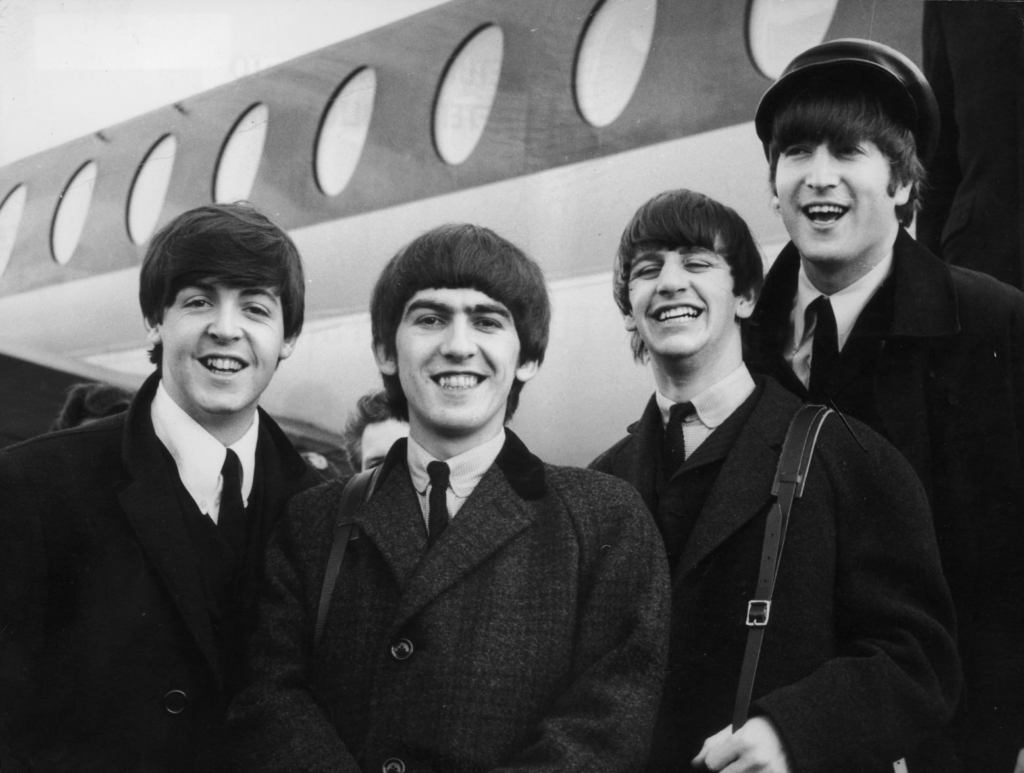
Pan Am & Beatlemania
With pioneering initiatives, Pan Am’s name will be enshrined in American aviation history credited as it is with several firsts, not least the inductions of Boeing 707 and 747 to trans-Atlantic flights, among others.
Also read: A festival goes global
In February of 1964, Pan Am brought The Beatles on their maiden concert tour to the US. John Lennon, Paul McCartney, George Harrison and Ringo Starr landed at JFK on Flight 101 Boeing 707-331 ‘Jet Clipper Defiance’, to a resounding welcome by 4,000 fans and a huge press contingent.
The iconic Pan Am filed for bankruptcy and ceased operations on December 4, 1991, ending the saga of the Pan American Corporation and the airline founded by two former US Army Air Corps majors in 1927 as Pan AmericanAirways. The shutdown led to some 8,000 employees losing jobs.
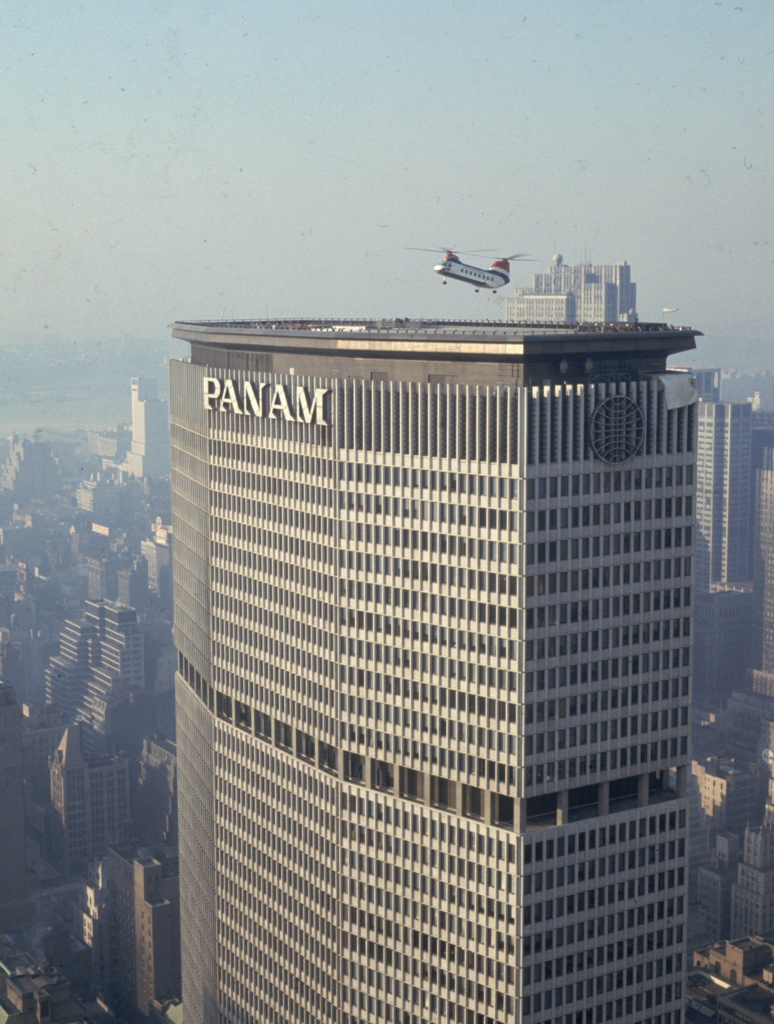
The Pan Am Building with 59 floors stood tall in mid-Manhattan on Park Avenue with the Grand Central Terminal in front and almost a stone’s throw away from a café my friend and host in New York owned. So, on a visit, I got to drive by the building several times. It has since come to be known as the Met Life Building and remains among the 100 tallest buildings in the US. At one point, it used to be counted among the largest commercial office space, and that in Manhattan is no small thing. Architecturally too, and as a layman, I thought its curvature was a marvel and much admired and talked of then, and certainly different from the geometrically straight-lines of the older Manhattan buildings. Structurally, I always thought of it as somewhat closer to the UN Plaza.
Also read: Boom town, difficult roads
The Atlanta-based Delta Airlines bought much of Pan Am’s assets, including the lucrative trans-Atlantic and European routes, making it a world leader. Today, Delta operates flights to destinations, including India, across the world.

Indian YMCA
In London, much to my disappointment, my friend in Oxford had me booked at the Indian YMCA close to the British Telecom tower, not too far from Oxford Street if my memory serves me right. Although I didn’t fancy staying there, in the end the stay turned out to be quite alright.
Also read: Autumn of 1971
For a first-time international traveller, I didn’t do too badly in the city. I stuck to a plan chalked out for me by the friend. And so doing the normal touristy things apart, I also went off on a tangent, including an accidental walk into a gay bar near Trafalgar Square, where I got icy stares that had me beat a hasty retreat, as also to a troublesome, crowded and rowdy nightclub.I committed the cardinal blunder of asking a young police officer – a man of colour from the Caribbean and possibly of Indian descent – the way out of the place and not only was he unhelpful, he gave me the suspicious and coldest of looks. Both certainly not pleasant experiences!

Café on the Thames
Ambling along the banks of the Thames, and after some time at a café overlooking the Westminster and the Big Ben, I thought of the Beatles. And, strangely, I hummed not a Beatles’ number, but one by Paul McCartney-Wings’ Café on the Left Bank.
Also read: Living next door to Gurugram
The Thames stirred lots of things we were fed as growing up kids in India. For some time as I walked around, I fancied myself to be a Dick Whittington in search of the gold-paved London streets. Anyway, like Whittington, not being able to see the streets so paved, I’d to content myself to seeing the permanently moored battleship HMS Belfast turned into a museum farther ahead along the river.
Just beyond the Tower Bridge and crossing it, huge blocks seemed to have been vacated and razed to the ground, making way for newly built-up places. Over time, and now, the blocks probably have some swanky and upmarket houses and offices, who knows?

Moving on from the Thames, a memorable visit was to Madame Tussauds, then the only one-of-its- kind wax museum in the world. Perhaps mistaking me for someone straight out of the museum wax exhibits – not really, just kidding – an elderly Englishman with his grandson, came upto me and struck a conversation. He had served in India in the military and by a strange coincidence was standing next to the figure of the redoubtable 1st Duke of Wellington –formerly Col Arthur Wellesley – who fought the legendary and one of the first Indian freedom fighters Kerala Varma Pazhassi Raja.
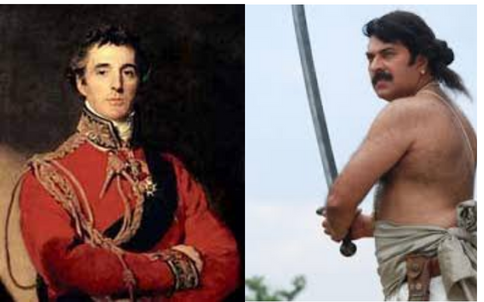
Pazhassi Raja’s guerrilla war
He waged a fierce guerrilla war against the East India Company in the jungles of North Malabar in present-day Kannur and Wyanad. He must have been among the early pioneers of jungle warfare. But for the deceit and treachery by his own aides, Pazhassi Raja wouldn’t have been defeated even though he was fighting a superior and trained English force.
Also read: Megacity Mumbai as I recall
In his dispatches, Arthur Wellesley made it abundantly clear that so long as Pazhassi Raja lived, the British wouldn’t be able to win. The Duke of Wellington paid glowing tribute to Pazhassi Raja’s bravery and fighting skills, reminiscing his battles with the legend, a trueblue-blood known for his courage and valour.He was pulled out of India to fight the then Napoleonic Wars. He returned to England in 1804, not completing his campaign against Pazhassi Raja.
This brings me to a lack of a proper memorial to this great son of India. Save for some structures supposedly erected in his memory in Wyanad, and a small cottage doubling up as a museum near Kannur International Airport, I have not found anything significant to recall his sacrifice and for posterity to remember him. Where is he in the annals of India’s freedom struggle? Largely ignored and forgotten.
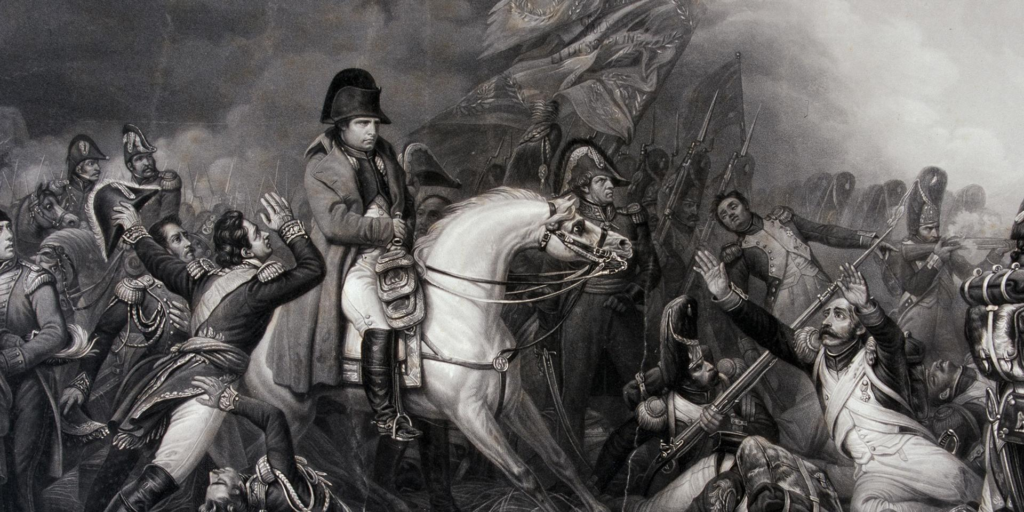
Napolean’s Waterloo
Wellesley’s most famous military exploit was at Waterloo, where in 1815, he defeated Napolean Bonaparte. He went on to become the Prime Minister of the UK twice. The Duke of Wellington had earlier seen action in Flanders and in the Anglo Mysore War at Srirangapatnam.

A cigar in Florida
Like New York, the older London Underground trains were rickety and a far cry from the present-day metro passenger trains of Washington DC or Hyderabad. The overhead monorail trains carrying people, mostly tourists, to EPCOT Center at the Walt Disney World Resort in Bay Lake, Florida, with attractions such as Sea World and Disney World, were marvellous – literally flying at great speed over roads and vast stretches of afforested land. The most attractive feature of the Florida coast is the weather, warm, moist and humid, and the tropical flora and fauna. There are a great many swamps in the state, including the Everglades along the Atlantic Ocean and so clearly visible from the plane into Palm Beach and Orlando.
Also read: Why oh why do I love Kochi!
Whilst in Florida I spared a thought for Fidel Castro, then ruling Cuba, the Bay of Pigs, cigars, nay Puros, and how two nuclear powered nations nearly came to a conflagration. Almost in remembrance, I helped myself to a Havana in Florida!
Also read: Road to a carbon-free future



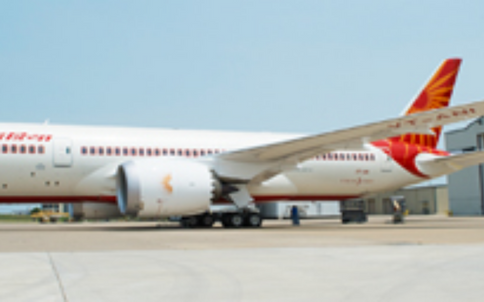

[…] Also read: A piece of history and Havana […]